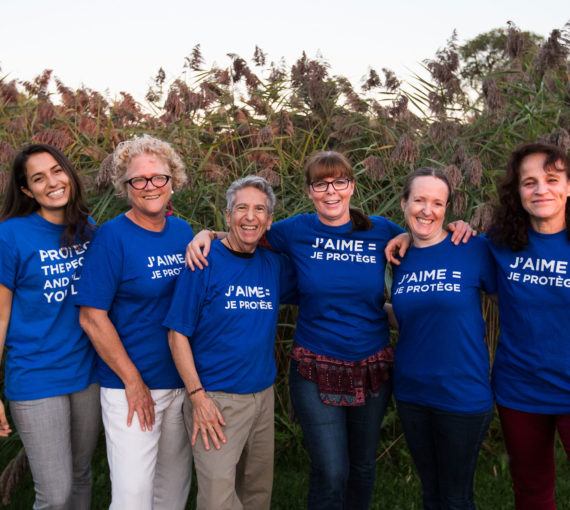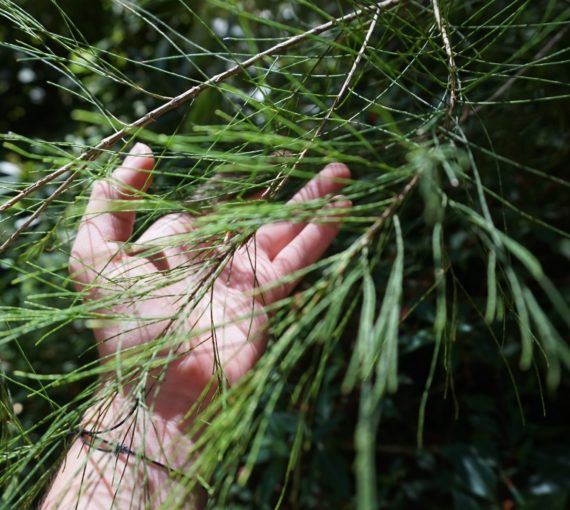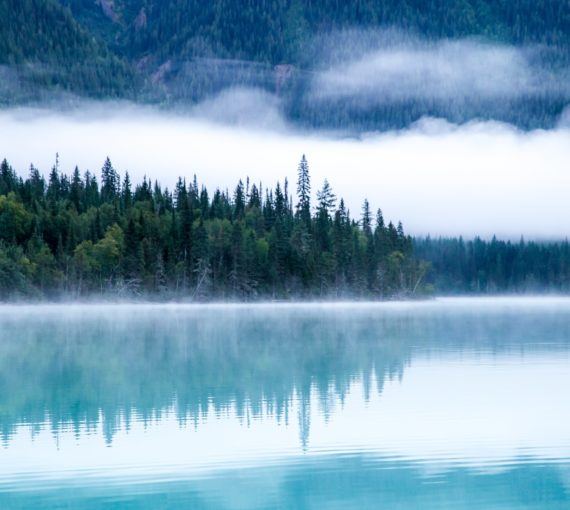
Walking barefoot (a.k.a. “Earthing” or “grounding”) transfers electrons, improving chronic stress, quieting the mind and promoting relaxation. (Photo: Annie Spratt via Unsplash)
I have a dream job. I work with amazing people on issues I care deeply about: wildlife and Indigenous rights. I feel lucky to come to work every morning. But the work isn’t easy. I regularly visit Indigenous traditional territories where once abundant wildlife has been decimated by industrial disturbance. I try to safeguard habitat but often feel my successes are just tiny steps forward — or sideways — as habitat continues to disappear.
How do I cope? I celebrate victories, however small, and the relationships they come from — for this work is impossible to do alone. I find meaning in the work itself. I go outside. And, at the end of most days, I read fiction.
As an English major turned enviro, reading is my solace. I have a precarious stack of books beside my bed and a revolving door at the library. At about 8:30 p.m., I start to crave the escape that books bring from the sometimes overly complex world we all inhabit. While others turn to Netflix, I happily turn to the authors listed below.
These amazing storytellers stepped out of their writing lives to stand with Grassy Narrows, a remote Indigenous community deeply affected by mercury poisoning. More than 50 years ago, Ontario allowed around ten tonnes of mercury to be dumped into the Wabigoon watershed the community depends on for food and livelihood.
Despite a recent science report showing the watershed can be remediated, the provincial and federal governments have refused to make a commitment to clean it up.
Most of the fiction I read is about, in one form or another, how we — collectively and individually — forge identity, through relationships with each other, the land and our histories.
The story of Grassy Narrows is about a community that has been living off the land, and thriving, for millennia. Before the mercury dumping, the community had 90 per cent employment, based on commercial fisheries, tourism and sport-fishing trips. The land and water offered the community sustenance, and the community safeguarded its territory in return.
But the current chapter is one of conflict. It’s easy to see who the protagonists are: Grassy Narrows community members have been tireless champions of social justice for decades, advancing the need for remediation to an often indifferent world. The antagonist? The provincial government, which allowed the mercury to enter the waterways in the first place and has yet to take responsibility for it.
My story is also deeply connected to this beautiful land I am so honoured to call home. Long before it was home to me and my family, it was home to Indigenous peoples. The mercury that poisoned the people of Grassy Narrows is but one of the many injustices Indigenous peoples in Canada have faced and continue to face. Both Premier Wynne and Prime Minister Trudeau said they are committed to reconciliation. We must hold them accountable. They must commit to remediate the Wabigoon River.
Authors who are standing with Grassy:
- Andre Alexis
- Angie Abdou
- Margaret Atwood
- Mona Awad
- Deni Béchard
- Dennis Bock
- Joseph Boyden
- Cathy Buchanan
- Catherine Bush
- Jowita Bydlowska
- Sasha Chapman
- Karen Connelly
- David Cronenberg
- Anthony De Sa
- Esi Edugyan
- Marina Endicott
- Charlie Foran
- Will Ferguson
- Doug Gibson
- Graeme Gibson
- Don Gillmor
- Charlotte Gray
- Kenneth J. Harvey
- Rawi Hage
- Elizabeth Hay
- Teva Harrison
- Lawrence Hill
- Miranda Hill
- Wayne Johnston
- Adrienne Kress
- Alice Kuipers
- Vincent Lam
- Kateri Lanthier
- Catherine Leroux
- Linden MacIntyre
- Stephen Marche
- Yann Martel
- Ken McGoogan
- Bruce Meyer
- Lisa Moore
- Marina Nemat
- Michael Ondaatje
- Christine Pountney
- Andrew Pyper
- Michael Redhill
- Robert Rotenberg
- Elizabeth Ruth
- Robert Sawyer
- Sarah Selecky
- Antanas Sileika
- Merilyn Simonds
- Johanna Skibsrud
- Linda Spalding
- Eva Stachniak
- David Suzuki
- Ania Szado
- Madeliene Thien
- Miriam Toews
- Ayelet Tsabari
- Jane Urquhart
- Russell Wangersky
- Zoe Whittall
- Michael Winter
- Alissa York
Click here to see images of the writers’ feet, showing they stand with Grassy!
Want to take action? Take a picture of your own feet and post it on social media with the tag #standwithgrassy. And tell Prime Minister Trudeau and Premier Wynne that you, too, stand with Grassy Narrows, and will do so until the watershed is cleaned up.
Our work
Always grounded in sound evidence, the David Suzuki Foundation empowers people to take action in their communities on the environmental challenges we collectively face.



